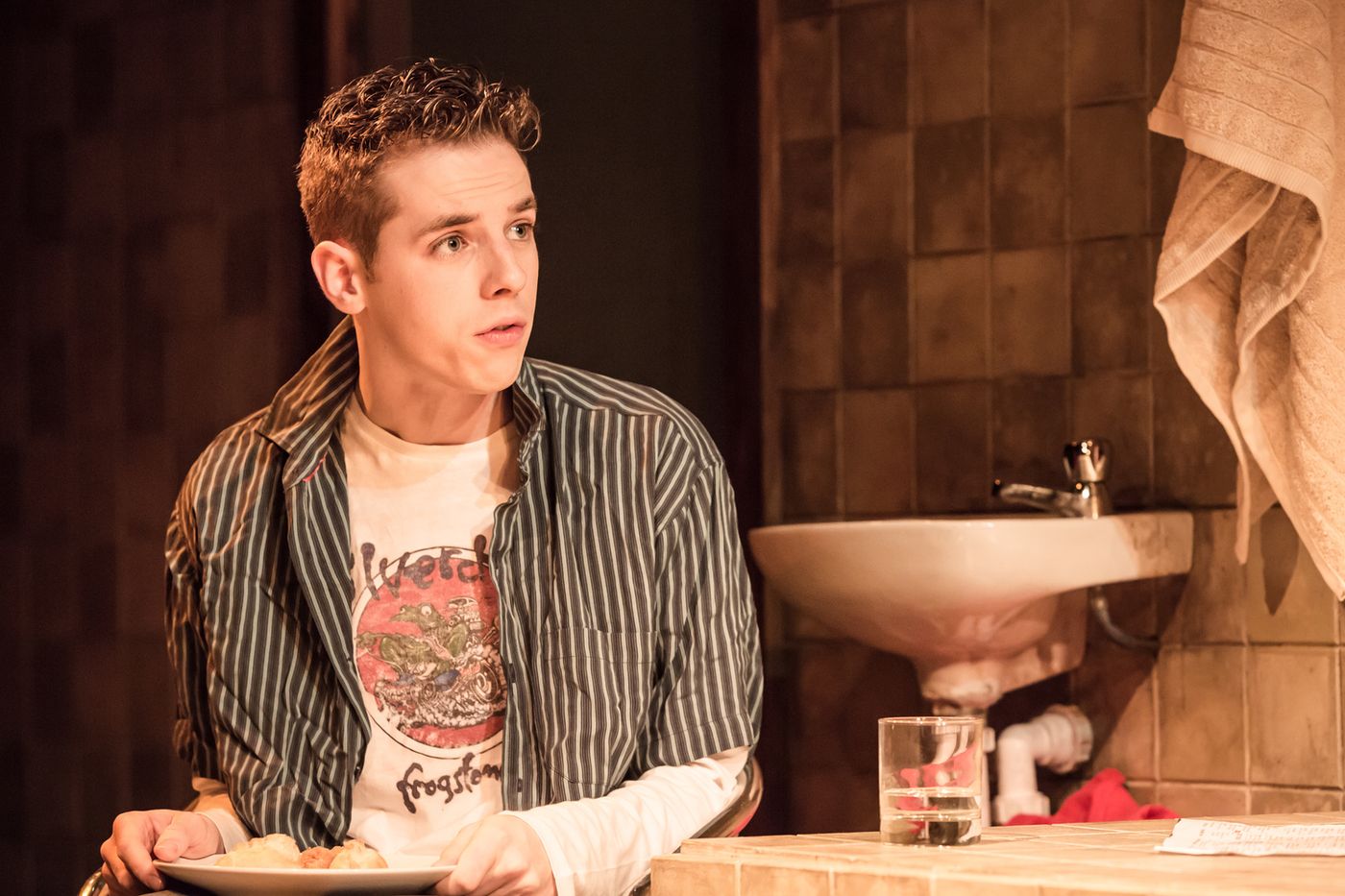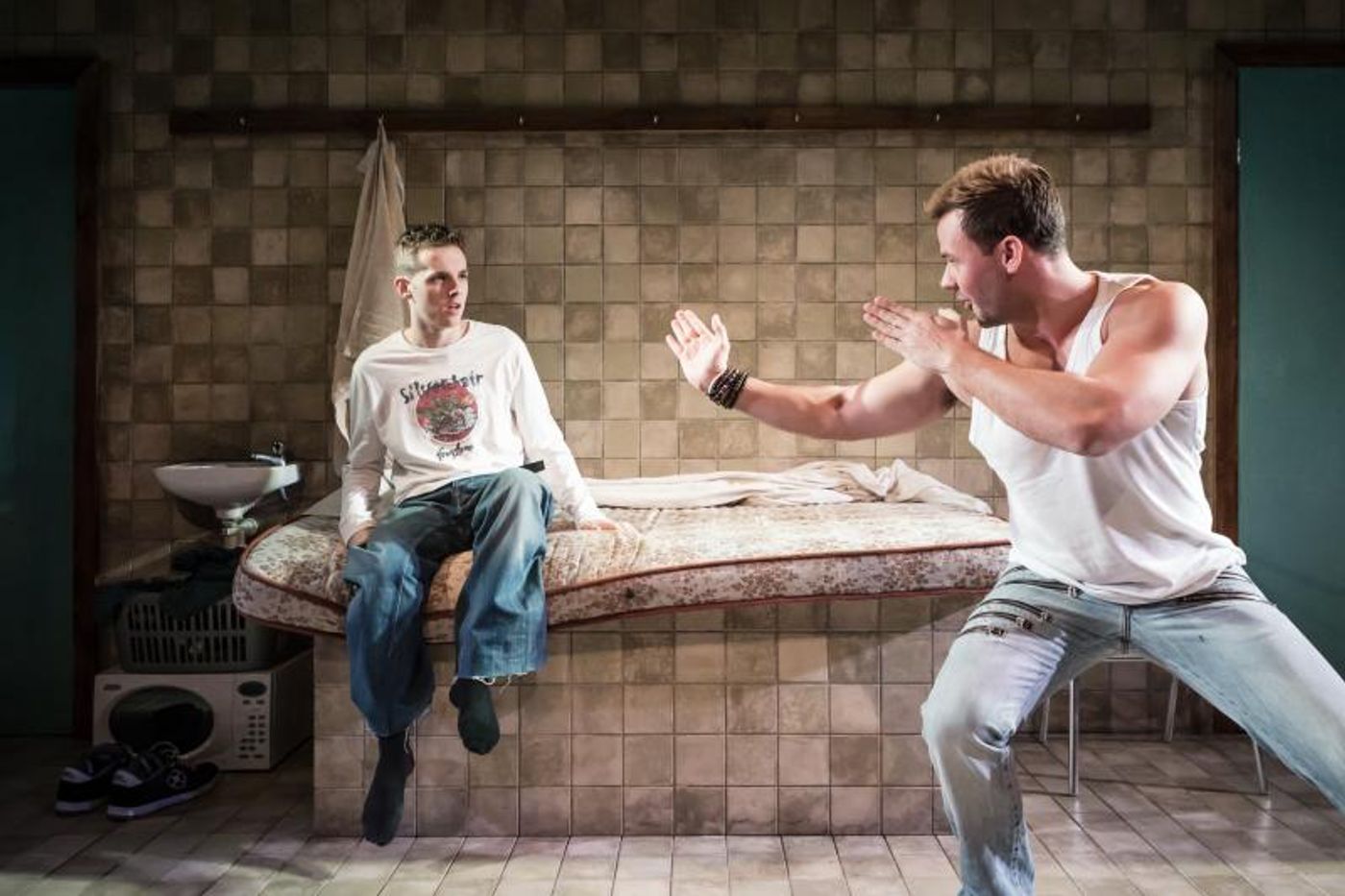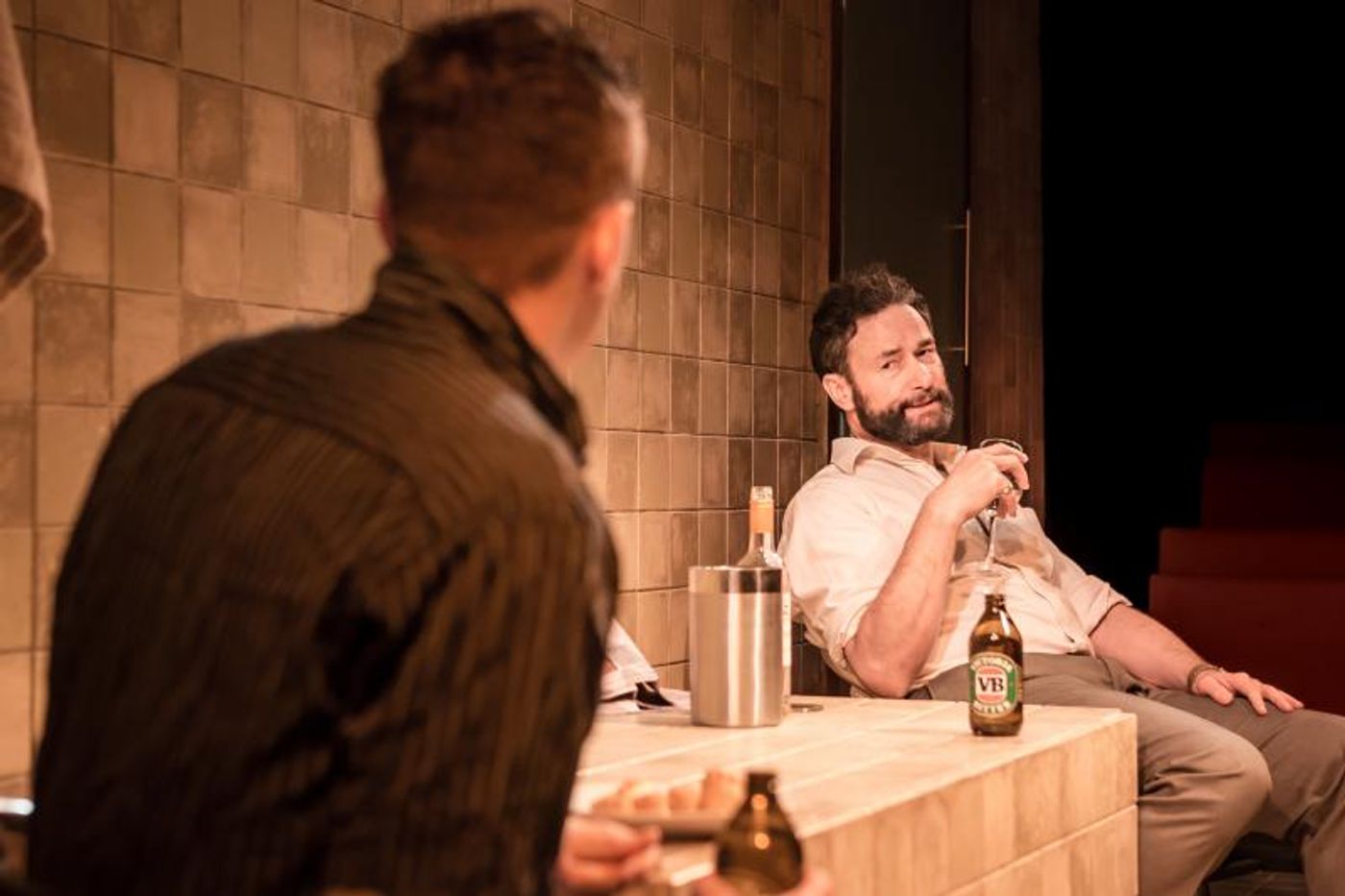Interview: Roly Botha Talks STRANGERS IN BETWEEN

Strangers in Between
When Strangers in Between played at the King's Head Theatre in 2016, it marked Roly Botha's first professional role in theatre. Two years later, Roly makes his West End debut in the show's transfer to the Trafalgar Studios.
Catching up backstage, Roly shares how he got here, audience reactions, and how the show resonates with him personally.
What's your earliest memory of theatre?
Well, I grew up on the Isle of Wight, and there isn't much theatre there (we have a couple of arts centres). The earliest thing I distinctly remember was seeing Sooty and Sweep at Medina Leisure Centre on the Isle of Wight when I was five or six. I remember I had a little VHS of Sooty and Sweep which we just watched on loop.
I'm assuming it wasn't then that you realised you wanted to get into acting?
No, not during the show! But actually it probably was that early on. It's been the only thing I've ever wanted to do my whole life, really: performance of some description.
It's in the family a bit - my grandmother is an actor and she's still acting, which is great. And my mum used to do some jobs, and my granddad as well was a producer. So I've always known that this was a possible profession, that some people do it. But I've always been discouraged from it my entire life!
Really?
Yes. Every single time I said I wanted to be an actor, all of my family were like, "Trust me: you don't, it's tough".
So how did you then get into acting?
Well, we did some shows at school: Blood Brothers, We Will Rock You, all that sort of stuff. But my first role out of school was when I was 12, and it was a production of Elegies For Angels, Punks and Raging Queens. I was playing Roscoe, a transvestite who's died from AIDS and I sang a song about it.
So that was the first thing I ever did when I was twelve12years old...on the Isle of Wight...and it got in the paper! I mean, the Isle of Wight is not the most progressive place (it is getting better). But it caused a bit of a stir, from what I can remember.
Then when I went to high school, the schooling system on the Isle of Wight was changing at the time. So my family and I decided it would be better for me not to go to school on the Isle of Wight. But we didn't have any money, so I managed to get a drama scholarship, a bursary to quite an artsy school on the mainland.
And that was where I really started to get it. And after that, I got into the National Youth Theatre and then I got this job. Strangers in Between was the first job I ever did professionally, back at the King's Head Theatre in 2016. And since then, I've been working full time. I've been very lucky.
Let's talk about Strangers in Between. Can you tell us a bit about your character?
Shane is a young kid from Goulburn in New South Wales, Australia. And the story of the show is essentially his journey. He leaves Goulburn and he arrives in Sydney, which to him is this hub of metropolitan liberalism and progressive stuff.
And he's gay and he's searching for a sort of community, in that young and quite naive way that people do. He's got this real notion of Sydney in his head as being that place, but then he's confronted with the reality of it.
And does the character resonate particularly with you?
Absolutely. I mean, growing up in a rural place and looking at London is my equivalent of Sydney. It's this kind of place where they have bars and restaurants and trains...
And people stay out beyond 9pm!
Exactly. And shops stay open on a Sunday!
I think that part of Shane running away from home and moving to the city definitely resonates. I love the Isle of Wight, but I ran away when I was 13. And I go back to see my family and to do kung fu with my teacher who lives there, but that's kind of it.
I think that was sort of my way in with Shane; when I first read the play, it was tapping into that journey.

Strangers in Between
Let's just go back to the kung fu for a second.
Well I've been studying and practising kung fu since I was about eight, and I've been teaching it since I was about 15. I actually went to China a couple of years ago and I may be going again next year, just studying with the old masters.
Kung fu is really good for acting, surprisingly. You know, that breathing and grounding and centring and the freedom of movement. And it's something completely different for me to do, which helps my brain get out of whatever gutter it's in.
And how else do you think the show resonates with audiences?
I mean, obviously with gay audiences and with Australian audiences, there's a very instant thing to grab hold of...it is a gay play in Australia! But the beautiful thing about the show is that it's universal.
We had a post-show Q&A a few days ago, and a woman in the crowd said, "As a straight woman who's not of Australian descent, this play resonates because it's a story about growing up".
It's a story about discovering your friends and family, the people who you want to spend time with and the people you want to be your family. And at the end of the day, it's not about blood.
And it's hilarious, it's so funny. It's funnier this time than when we've done it before, we've discovered lots of new bits and pieces since the first run.
How was the original production at the King's Head Theatre?
Terrifying. But I absolutely loved it and the second time we did it in January last year as well, it was brilliant.
I was actually just saying to Christine, our Stage Manager, how lucky I feel to be surrounded by such supportive, loving people on this project. Everyone from Adam Spreadbury-Maher, our director, to Christine, to the most recent member of the team, Eloise, our assistant.
Everyone really helped me on that first run. You know, I didn't go to drama school, I didn't train. I had no idea what I was doing, other than this instinctive desire to be acting. And they all were so supportive. If I was asking stupid questions, I wasn't made to feel stupid.
I loved it and learned so much from it and I'm incredibly grateful to everyone for it.
Learning by doing.
Exactly. And that's sort of what I convinced my parents I was doing.
When I left school, I was offered a place at university which I decided to defer. That was a few phone calls to my parents. And that was studying Drama. I was initially thinking of studying Philosophy or something, but the conclusion I came to was that I didn't want acting to be my part time thing.
So I said to my parents, "Look, I'll take a year out. And if I can make it work within that year, I'll make it work and if I can't, I'll go to uni". And I have made it work. This is still my gap year, two years later I'm still doing that.
And two years on, you're now at Trafalgar Studios with the same supportive cast and creative.
Yes. I don't know how they've managed to keep this team together for one and a half years, with timetables and everything. But the stars have aligned.

in Strangers in Between
So you must know each other and the play beat by beat. Does anything ever surprise you?
Yes, every night...Christine just gave me a really knowing look! I'm thinking of something, but there are some things that probably stay in the show report.
I mean textually, Tommy Murphy's writing is so rich and there's so much going on in there; every time we've rehearsed it, we're finding new things. Even a couple of nights ago I said to Dan Hunter, "I've just realised I've been reading this line incorrectly all this time".
And working with two fantastic actors, there's always new stuff. It's a joy to work with them, because they're both so relaxed in it. And we've had a lot of time to sit on these characters, we've had a year since we've last looked at them, so they've been stewing somewhere in the back of our minds.
How have audiences been reacting to the show?
The reactions are actually really interesting. You get some audiences that feel as though they need to be given permission to laugh. I don't know what it is, maybe there's something about what people are expecting when they come in.
And to be confronted with an opening scene that is quite quick with a few big gags in there, you can feel some audiences going, "Oh, cool. We're allowed to laugh". And then you get some audiences that are invested just in the drama of the piece and the human interactions in it.
And the intimacy of the space heightens that investment. You are literally so close!
Yes. And Adam did give us a very lovely note during previews, because we weren't used to that intimate a space, literally having feet in our playing space. We were shying away from it a bit. So his note was: "No, no, no: just go stand amongst the audience. Make them move".
There are those moments in the show where someone is being pushed back by someone else, and it's a real joy as an actor to be able to take that into the audience. The kind of spacial relationships between the characters in this show is something we spent a lot of time working on.
Finally, why should people come and see Strangers in Between?
I think it's a really loving story, it's tender and it's heart-warming. And it carries a pretty hard-core emotional punch.
I just think it's a beautifully written play. For me as an actor, it's rare for me to sit down and read a play that someone's offering and go, "That's a really good thing I've just read". Because plays are meant to be seen, not read. But with this, I was laughing and crying, just from reading the script.
And I'm still excited by it two years later, I'm still invested in it and I still find it funny. And if I'm not bored of it, then hopefully audiences won't be either.
Strangers in Between at Trafalgar Studios until 3 February
Photo credit: Scott Rylander
Powered by
|
Videos

